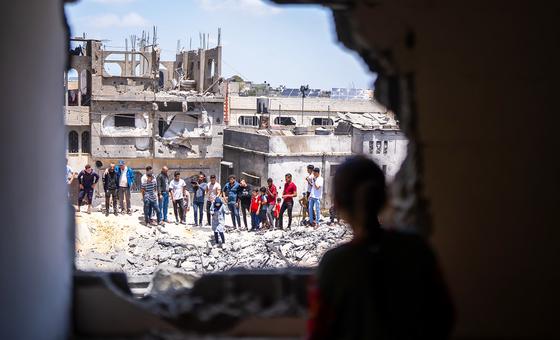Every effort continues to be made by the United Nations and partners to get aid supplies into Gaza following the Israeli order to evacuate the north of the enclave, the UN’s emergency relief chief said on Monday.
“History is watching,” Emergency Relief Coordinator Martin Griffiths told UN News in Geneva, highlighting the desperate situation facing around one million Gazans uprooted in the last week, after the Israeli military warned of an imminent offensive following the deadly 7 October attacks on Israel by militant group Hamas, which has controlled the Gaza strip since 2006.
“Aid access is our overwhelming priority. And we are in deep discussions hourly with the Israelis, with the Egyptians, with the Gazans about how to do that,” Mr. Griffiths said, adding that he was optimistic about hearing “some good news” soon that a solution could be found to the political impasse which has prevented aid convoys crossing from Egypt’s Rafah into southern Gaza.
The top UN aid official was speaking before heading to the Middle East, “trying to help, working with diplomats from all countries” to secure aid access and de-escalate the tinderbox situation, which UN Secretary-General described on Sunday as being on the “verge of the abyss”.
International responsibility
“It’s all Member States who have obligations…not just those in the region” to defuse the worst Israeli-Palestinian conflagration in decades, Mr. Griffiths continued. “The United States, the United Kingdom, the European Union and the Arab world all have obligations” to ensure that the lives of civilians are protected and the rules of war observed.
“Don’t attack civilian infrastructure, protect civilians when they move,” the UN official insisted. “Make sure they get the aid they need and make sure that there are corridors which allow them some respite from the relentless attacks that are happening upon them.”
Hostage crisis
Among the key issues facing diplomats is securing the release of a reported 199 Israeli hostages, seized during the Hamas raid, the UN emergency relief chief continued.
“This war was started by taking those hostages. Of course, there’s a history between Palestinian people and the Israeli people, and I’m not denying any of that. But that act alone lit a fire, which can only be put out with the release of those hostages.”
Amid ongoing airstrikes in Gaza and concerns over a regional escalation of the conflict – especially on the northern border with Lebanon – Mr. Griffiths reiterated the need for humanity to prevail.
“History is watching to see if the consequences of this war are going to be generationally bad or if there are going to be ways in which swiftly that can be rebuilt, some kind of comity or neighbourliness between those two tragic peoples. …(Those are) the messages I’ll be taking to the region about biased in favour of one or the other, that biased in favour of humanity.”

